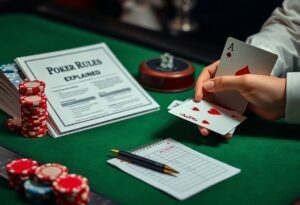Feeling overwhelmed by the intense stakes of a poker game can quickly lead to poor decision-making and costly mistakes. As a player, your ability to maintain emotional control is important for your success at the table. When you learn to manage your emotions effectively, you can make clearer decisions, assess your opponents better, and ultimately enhance your gameplay. In this blog post, you will explore the significance of keeping a level head during critical moments and how mastering your emotions can give you the edge you need to win.
Understanding Emotional Control
To succeed in poker, you must grasp the essence of emotional control. Managing your emotions effectively allows you to maintain focus and make sound decisions, even in high-pressure situations. Whether you are on a winning streak or facing losses, understanding how to regulate your feelings can significantly enhance your gameplay. Mastering this skill not only improves your performance but also provides an edge over your opponents who may struggle with their emotions.
Definition of Emotional Control
To put it simply, emotional control refers to your ability to manage and regulate your feelings and reactions during gameplay. It involves staying calm, composed, and making rational decisions, regardless of external pressures or internal turmoil. By honing this skill, you can navigate the ups and downs of the game with a level head.
The Role of Emotions in Poker
Between the thrill of winning and the despair of losing, emotions play a pivotal role in your poker experience. They can either enhance your gameplay or lead to hasty decisions that cost you dearly. Understanding this dynamic helps you become more aware of your emotional triggers and how they impact your performance.
In fact, letting emotions dictate your actions can lead to mistakes such as tilting, where frustration causes you to gamble recklessly. Conversely, learning to harness positive emotions can boost your confidence and enhance your strategic thinking. Being aware of how emotions affect your decision-making process allows you to maintain a competitive edge and avoid pitfalls that can derail your game. Ultimately, developing emotional control is a game-changer, positively influencing both your performance and your overall enjoyment of poker.
The Impact of Emotional Reactions
Clearly, your emotional reactions can significantly influence your performance at the poker table. When emotions are running high, your decision-making ability may become compromised, leading to impulsive actions that don’t align with your overall strategy. Recognizing the effects of your emotional state is important for maintaining a strong game and ensuring that you play your cards—both literally and figuratively—correctly.
Common Emotional Triggers
After identifying your personal emotional triggers, such as losses, bad beats, or overly aggressive opponents, you can better prepare yourself to face them calmly. These situations often elicit responses that can throw you off your game, making it vital to practice techniques for addressing them before they arise.
Consequences of Poor Emotional Control
Among the pitfalls of poor emotional control are increased tilt, poor decision-making, and significant financial losses. When you let your emotions dictate your actions, you are more likely to play recklessly, compromising all the hard work you’ve put into developing your skills.
For instance, if you experience a devastating loss and allow yourself to spiral into frustration, you may begin to chase losses with desperate bets that do not represent sound strategy. This can lead to a downward spiral, where your anger or sadness fuels further poor choices, resulting in rapid depletion of your bankroll. Alternatively, acknowledging your emotional state and employing techniques like deep breathing or taking a break can help you regain control, ensuring your decisions remain focused and logical.
Techniques for Maintaining Composure
You can significantly enhance your poker performance by employing effective techniques for maintaining composure. Staying cool under pressure not only improves your decision-making skills but also helps you project confidence at the table. Incorporating certain strategies into your game can be the difference between success and failure, as emotional control plays a pivotal role in your overall results.
Breathing and Relaxation Strategies
Beside considering the flow of the game, taking time to focus on your breath can be a game-changer. Practicing deep breathing exercises allows you to calm down in high-stress moments, as inhaling slowly through your nose and exhaling through your mouth helps to lower your heart rate and ground your thoughts. Implementing these simple techniques can create a mindset where you can better handle pressure.
Mindfulness and Self-Awareness
By cultivating mindfulness and self-awareness, you can become more attuned to your emotional triggers during the game. Understanding your feelings and reactions allows you to respond rather than react to challenging situations, enabling you to maintain composure. You learn to observe your thoughts without judgment and develop a more balanced perspective about wins and losses.
Plus, practicing mindfulness can foster a greater sense of emotional regulation during poker sessions. This attention to the present moment not only helps reduce stress but also enhances your focus. Opportunities to make calculated decisions emerge when you are not overwhelmed by emotions or distractions. By reinforcing your self-awareness, you’ll make clearer, more strategic choices, driving better long-term outcomes in your poker journey.
The Psychological Edge in Poker
Your ability to navigate the emotional landscape of poker not only enhances your gameplay but also gives you a significant advantage over opponents. Mastering your emotions, as well as recognizing those of your adversaries, allows you to remain focused and make well-informed decisions. The psychology of poker is as important as the mathematics, and developing this edge can lead to more consistent success at the tables.
Recognizing Opponent’s Emotions
Recognizing your opponent’s emotions during a game can provide valuable insights into their mindset and strategy. By paying attention to subtle cues such as body language, facial expressions, and betting patterns, you can infer whether they are feeling confident, anxious, or unsure. This awareness can help you adapt your approach and gain an upper hand in critical moments.
Using Emotional Control to Your Advantage
On the other hand, channeling your own emotional control effectively allows you to make decisions free from bias and pressure. By maintaining a calm demeanor, you enhance your ability to analyze situations objectively and execute your game plan without interference from stress or excitement.
But utilizing emotional control effectively can set you apart from other players. By staying composed in high-stress situations, you can avoid impulsive decisions that often lead to costly mistakes. Moreover, when you exude a sense of confidence and calmness, not only can you throw your opponents off their game, but you can also exploit their emotional reactions to your advantage. Understanding when to leverage their nervousness or aggression can create opportunities for profitable plays, ultimately enhancing your success at the table.
Practicing Emotional Control
After mastering the basics of poker, you need to focus on practicing emotional control. This involves implementing techniques that help you maintain your composure in high-pressure situations. Regularly engaging in self-reflection, mindfulness exercises, and breathing techniques can significantly improve your ability to manage your emotions at the table. The more you practice, the more natural it will become to stay calm, allowing you to make sound decisions regardless of the stakes.
Simulation and Training Methods
Above all, utilizing simulation and training methods can enhance your emotional control. You can use software that replicates various poker scenarios, allowing you to experience pressure without financial risk. Additionally, practicing with friends or joining a poker group will enable you to engage in realistic situations, effectively training your mind and body to react positively under stress.
The Importance of Experience
On your journey to becoming a successful player, your experiences play a vital role in shaping your emotional control. Each game you play offers valuable lessons that help you learn to manage your feelings effectively. Embracing both victories and defeats will provide you with insights into your emotional responses, allowing you to adapt your strategy over time.
Understanding how experience shapes your reactions at the poker table is important for your growth. Each hand you play provides an opportunity to observe how your emotions fluctuate and how they impact your decision-making. Analyzing your past experiences enables you to identify patterns in your behavior, particularly in high-stakes situations. By learning from both successes and mistakes, you can cultivate a more resilient mindset, which directly contributes to your ability to maintain control when it matters most.
Case Studies and Real-Life Examples
Once again, exploring how emotional control impacts the world of poker reveals insightful case studies:
- Phil Ivey: Known for his remarkable composure, Ivey’s win rate is around 20% in high-stakes tournaments.
- Daniel Negreanu: His ability to read opponents and manage stress led him to become one of the highest earners, with over $42 million in lifetime earnings.
- Chris Moneymaker: After winning the 2003 World Series of Poker, Moneymaker’s calm demeanor helped him overcome pressure, leading to a 9 times increase in player population.
Professional Players Who Mastered Emotional Control
Against significant odds, top players such as Phil Ivey and Daniel Negreanu exemplify mastery over emotional regulation. Their success is attributed to their unparalleled focus and ability to stay cool under pressure, forming a template that you can emulate in your poker journey.
Lessons Learned from Emotional Missteps
From numerous poker blunders, many players have experienced the fallout of poor emotional control. These incidents serve as valuable lessons that highlight the necessity of a steady mindset in high-stakes scenarios.
In fact, when players like Mike Matusow found themselves falling apart, the consequences were severe, leading to losses of thousands in a single hand. Such moments can be attributed to tilting, where emotions overrun strategy. You should take note of these crucial insights: developing emotional resilience can be your best defense against large losses and enable you to maintain composure in challenging situations. Understanding these emotional missteps provides you with the tools to navigate the game more effectively, minimizing the risk of letting emotions dictate your play.
Final Words
So, prioritizing emotional control in poker is vital for your success at the table. By staying calm under pressure, you enhance your decision-making abilities and mitigate the risks of making impulsive choices. This not only improves your gameplay but also helps you maintain a competitive edge over your opponents. Embracing strategies to manage your emotions will lead to greater consistency and ultimately, a more rewarding poker experience. Take these insights to heart and elevate your game to new heights.




